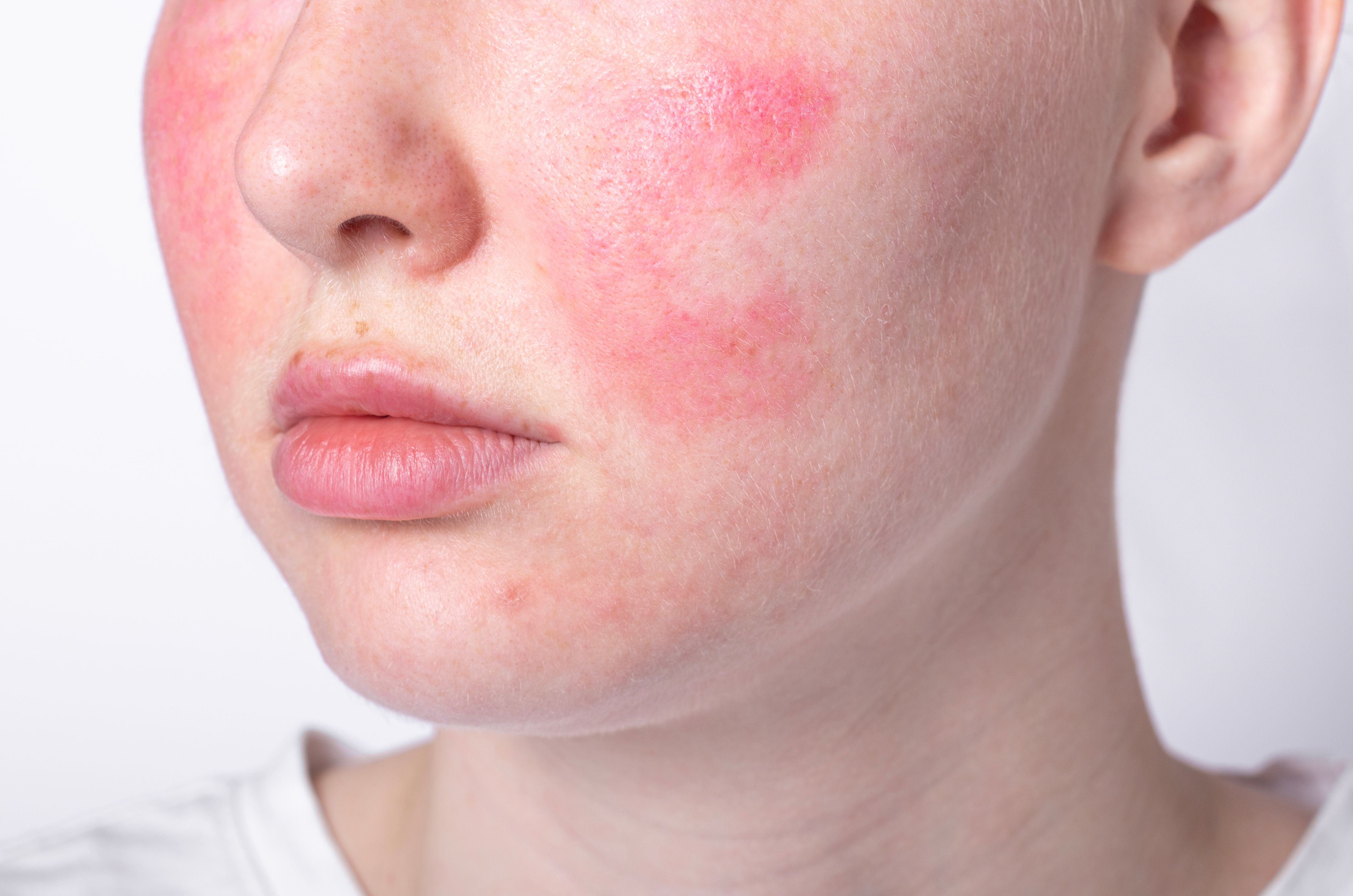- Acne
- Actinic Keratosis
- Aesthetics
- Alopecia
- Atopic Dermatitis
- Buy-and-Bill
- COVID-19
- Case-Based Roundtable
- Chronic Hand Eczema
- Chronic Spontaneous Urticaria
- Drug Watch
- Eczema
- General Dermatology
- Hidradenitis Suppurativa
- Melasma
- NP and PA
- Pediatric Dermatology
- Pigmentary Disorders
- Practice Management
- Precision Medicine and Biologics
- Prurigo Nodularis
- Psoriasis
- Psoriatic Arthritis
- Rare Disease
- Rosacea
- Skin Cancer
- Vitiligo
- Wound Care
News
Article
Dermatology Times 2024 In Review: Rosacea
Author(s):
As 2024 comes to a close, Dermatology Times is taking a look back at the studies, therapies, and advances in rosacea this year.

Estrogen, Hormone Changes Play Role in Rosacea and Skin Alterations, Study Finds
The study explored the potential role of hormonal changes, specifically estrogen levels, in the pathogenesis of rosacea.
National Rosacea Society Launches Seal of Acceptance Program
Alongside expert dermatologists, the NRS developed a Seal of Acceptance for skin care and cosmetic products clinically tested and evaluated for patients with rosacea.
Acne and Rosacea Pearls With Jim Del Rosso, DO, FAAD
The American Acne and Rosacea Society welcomed Del Rosso as its new president, and he shared key takeaways from his AAD sessions.
One study uncovered high levels of CGRP in patients with rosacea, with levels not affected by age, sex, BMI, and other factors.
Variable-Sequenced Large-Spot KTP and PDL Demonstrate Comparable Efficacy in Rosacea
Researchers compared a variable-sequenced, large-spot 532 nm KTP laser to the 595 nm pulsed-dye laser
Jessner’s Lymphocytic Infiltration of the Skin Mimicking Rosacea: A Rare Case Presentation
Chinese clinical researchers presented a unique case of JLIS manifesting as erythematous papules and infiltrative plaques on the nose and upper jaw, resembling rosacea.
Scores for erythema, dryness, quality of life, and aesthetic improvement were all markedly improved in patients using tranexamic acid versus traditional therapy alone.
Low-Dose Isotretinoin to Treat Resistant Rosacea
Researchers found evidence from numerous studies claiming LDI could improve rosacea symptoms and decrease flare-ups.
Could Tranexamic Acid Be Key to Treating Rosacea?
A review found the antifibrinolytic drug performed well in several clinical studies, none of which reported severe adverse events.
The Role of Vitamins and Nutrients in Rosacea Management
A study reviewed the current evidence on the impact of key vitamins and minerals on rosacea and provided clinical recommendations.
Topical vs Systemic Treatments: Rosacea Lesion Reduction Compared
A review of 43 studies found that systemic treatments generally provide greater reductions in rosacea ILs compared to topical therapies.
JAK Inhibition With Upadacitinib and Abrocitinib Shows Potential in Rosacea Treatment
Research evaluated 6 patients with rosacea treated with JAK1 inhibitors upadacitinib and abrocitinib.
Study Links Genetic Markers in Rheumatoid Arthritis and Rosacea
The study found 277 differentially expressed genes shared by RA and rosacea, opening up opportunities for treatment research.
History of Smoking May Correlate With Rosacea Risk, Study Poses
Mendelian randomization suggested a potential causal relationship between the 2 variables.
Study Investigates BTX Dosage for Rosacea Treatment
The study found that higher doses of BTX “significantly” improved facial erythema and patient quality of life compared to lower doses.
Study Links Sun Protection to Better QoL in Rosacea
The study stated that enhancing patient education and psychological support can improve rosacea management and quality of life.
Isotretinoin’s Role in Rosacea Management
A review found the LDI shows significant symptom improvement but needs further study for long-term maintenance.
Insights on Rosacea Treatment with James Del Rosso, DO
Del Rosso’s cases emphasized the importance of thorough patient evaluation and communication with other health care providers.
Rosacea Treatment: Letting the Patient Lead the Way
Hilary Baldwin, MD, emphasized involving patients in the decision-making process to create a personalized and cost-effective plan.
Highly Prevalent, Scarcely Supported: Common Skin Issues Remain Underserved
Experts shared pearls for acne and rosacea care at Maui Derm NP+PA Fall.
Ferulic Acid Effective in Treating Papulopustular Rosacea
The trial results indicated improved disease control, integrity of skin barrier, and minimal reactions for patients with rosacea.
New TRoSA Scale Standardizes Telangiectasia Severity in Rosacea
Designed to fill a gap in rosacea evaluation, the TRoSA scale provides an objective method for tracking telangiectasia severity, which could also be integrated with AI for automated assessments.
FDA Approves Journey Medical’s DFD-29 for Rosacea
The minocycline hydrochloride extended release capsules (40 mg) represent a new standard of care for patients with rosacea.
Advances and Challenges in Rosacea Treatment: Insights From Hilary Baldwin, MD
At the 2024 SDPA Fall Conference, Hilary Baldwin, MD, highlighted innovative strategies for managing complex rosacea cases, the importance of combination approaches, and a slowing treatment pipeline.
Patients with Rosacea are More Likely to Develop Anxiety and Depression
In Middle Eastern communities specifically, patients with higher disease severity and duration are predicted to have poorer psychological outcomes.
Don’t miss a moment of Dermatology Times by signing up for our eNewsletters and subscribing to receive the free print issue and supplements each month.
Newsletter
Like what you’re reading? Subscribe to Dermatology Times for weekly updates on therapies, innovations, and real-world practice tips.














